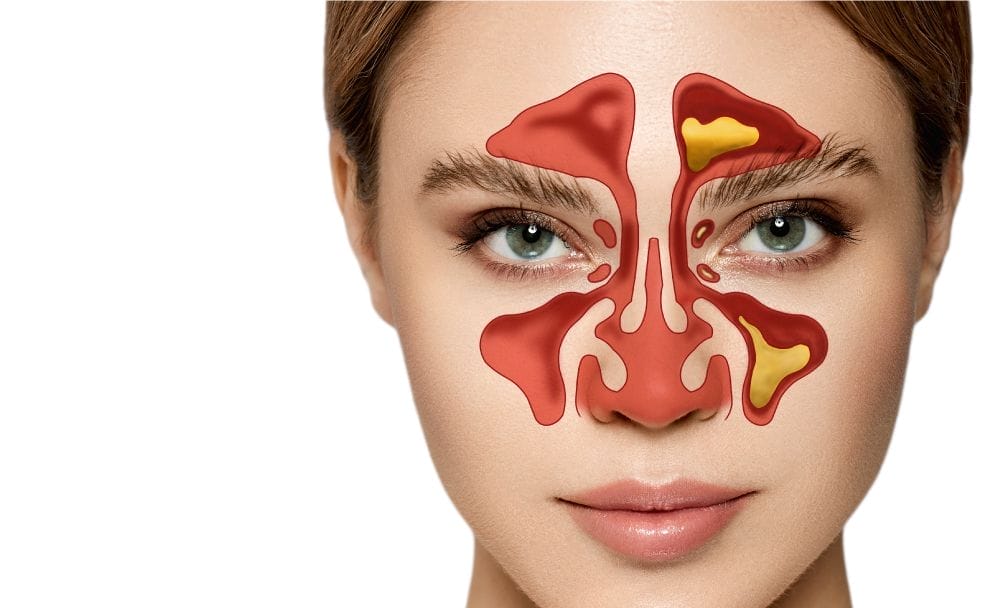
Sinusitis infection, also known as rhinosinusitis, is a common condition characterized by the inflammation and swelling of the nasal passages and the sinuses. Sinus disease is fairly common globally and gains prominence during the winter and spring seasons. [1] When the sinuses become infected or blocked, it can lead to discomfort and a range of sinusitis symptoms. Sinusitis may be acute or subacute, based on which its duration and symptoms may vary. [2] This article will explore sinusitis symptoms, causes, risk factors, sinusitis treatment options, and more related to sinusitis infection.
What is Sinus?
The sinuses are cavities or hollow spaces within the bones or other tissues. There are four pairs of sinuses:
- The frontal sinuses in the forehead
- The maxillary sinus in the cheekbones
- The ethmoid sinuses between the eyes
- The sphenoid sinuses behind the nose
The paranasal sinuses, a group of air-filled cavities, increase in the bony structure without adding significant mass. These sinuses produce mucus, while the cavernous sinus receives blood from the cerebral, ophthalmic, and emissary veins. [6]
Symptoms of Sinusitis Infection:

The symptoms of sinus infection can vary from mild to severe and may include:
- Facial pain, fullness, or pressure
- Nasal discharge that is watery at first and then turns purulent
- Sinus headache alongside facial pressure
- Hyposmia, anosmia, maxillary dental pain, and ear fullness or pressure
- A persistent cough
- Feeling tired, lethargic, and fatigued, especially in cases of sick sinus syndrome
- Nasal congestion due to blockage of the nasal passages
- Severe sinusitis symptoms also include high fever [3]
- Snoring, mouth breathing, feeding problems, and bad breath in children [2]
Causes of Sinusitis Infection:
Sinus infection can be caused by various factors, including:
Infection of the sinuses: These are usually rhinogenic and tend to spread from the nose into the sinuses. Conditions such as nasal swelling, nasal inflammation, and nasal polyps can all predispose to chronic sinusitis. [5]
Drug side effects: Certain medications, like oral contraceptive agents may exacerbate the symptoms of chronic sinusitis. Drugs influencing vascular tone and medicines such as aspirin and nonsteroidal anti-inflammatory drugs may induce sinusitis symptoms. [5]
Certain seasons, environmental factors, and allergies: Allergic reactions to environmental allergens, air pollution, seasonal mites, and allergen concentration can trigger inflammation and congestion in the nasal passages, increasing the risk of developing sinusitis. [5]
Personal Habits: Studies have shown that fatigue and sleep deprivation may predispose persons to chronic sinusitis on one hand, on the other excessive sleep may also make the condition worse. [5]
Other factors: There may be other causes of sinusitis, such as physical hypersensitivity to changes in temperature, barometric pressure, drafts, irritants, or even emotional reactions to stressful situations, and idiopathic hypersensitivity. [5]
Risk Factors for Sinusitis Infection:
Certain factors may amplify the risk of developing sinusitis infection, including:
Genetic diseases: Genetics can affect the risk of developing sinusitis. Certain genetic diseases such as cystic fibrosis, primary immunodeficiencies, and primary ciliary dyskinesia may contribute to an individual’s susceptibility to chronic inflammation, increasing their likelihood of experiencing recurrent or severe sinusitis infections. [1]
Environmental factors: Factors such as exposure to allergens, pollutants, and irritants can increase the risk of sinusitis. [1]
Smoking: Tobacco smoke, whether first or second hand irritates the nasal passages and impairs the normal functioning of the respiratory system, making smokers more prone to sinusitis. [1]
Gastroesophageal reflux and asthma: These also exhibit an association with developing chronic rhinosinusitis. [1]
Treatment of Sinusitis Infection:
The sinusitis treatment approach may vary depending on the severity and underlying cause. Common treatment options include:
Symptomatic relief: Nasal steroids and nasal saline irrigation can help alleviate symptoms, bring down blockage, and promote sinus drainage. [3] Apart from saline nasal sprays, humidifiers, aromatic vapors, warm aerosols, steam, hot soups, and teas can also help moisturize the nasal cavity and remove thick mucus crusts and thus alleviating symptoms. [2]
Antibiotics: If the sinus problem persists for an extended period, a healthcare provider may prescribe antibiotics and sinus medicine, such as amoxicillin with clavulanate to eliminate the infection. [3]
Corticosteroids: Intranasal corticosteroids can help reduce the swelling, irritation and the inflammation in your nasal passages, providing relief from symptoms [4], especially for seasonal and perennial allergic rhinitis, perennial non allergic eosinophilic rhinitis, and nasal polyps. [5]
Dietary restrictions: This is the first line of treatment for individuals with sinusitis and may prove beneficial. [4] Certain food allergies can lead to chronic sinusitis symptoms such as nasal stuffiness, facial pressure, and fatigue. Eliminate milk, wheat, or red wine products and add spicy food to the diet, such as garlic, horseradish root, and cayenne pepper. [5]
Exercise: Vigorous exercise may sometimes help increase nasal sympathetic discharge and have a decongestant effect providing relief in case of a sinus headache. [5]
Environmental changes: Certain geographic regions where the concentration of allergens is high may be troublesome for some patients. Moreover, atmospheric inversions and drops in barometric pressure may cause sinus difficulties. Thus a change in environment can be significantly helpful. [5]
Surgical intervention: In cases where other treatments fail to provide relief, surgery may be considered. Procedures such as endoscopic surgery, directed at abnormalities of the ostiomeatal unit, may offer considerable relief for selected patients. [4]
Ayurvedic intervention: According to Ayurvedic science, sinusitis is caused due to the dosha imbalance and the main dosha involved is vayu and kapha dosha. Thus the anti-inflammatory properties of Dasmoola kwatha, Tribhuvan kirti rasa, and steam inhalation works wonders for sinusitis. These treatments have the potential to alleviate inflammation in the nasal passages, promote mucus relief, and facilitate sinus drainage. Apart from this, Anu tail is also a great addition and aids in decongesting the sinus ostium and thus Tribhuban kirti Rasa, Dasamoolakwatha inhalation, Anu tail Nasya are much preferred in the treatment methods. [7]
FAQ
How can you prevent sinusitis infection?
While it may not always be possible to prevent sinusitis infection, certain measures can help reduce the risk of developing the condition:
✓ Maintain good hygiene: Regularly washing hands with soap and water, especially during the cold and flu season, can help prevent the spread of viruses and bacteria that can cause sinusitis.
✓ Manage allergies: If you have known allergies, work with a healthcare professional to develop an allergy management plan to minimize the risk of sinusitis.
✓ Avoid irritants: Minimize exposure to environmental irritants, such as cigarette smoke, chemical fumes, and strong odors, as they can aggravate the nasal passages and increase the risk of sinusitis.
✓ Stay hydrated: Drink plenty of fluids to moisturize the nasal passages and promote proper drainage.
How to cure sinus permanently through Ayurveda?
Some of the best cures Ayurvedic cures for sinusitis include:
✓ Boil four glasses of water and add basil leaves, mint leaves, two cloves, and a piece of ginger in it. Sip at it throughout the day once it cools down.
✓ Get the juice out of a piece of ginger by grating it. Have this juice with honey two-four times a day.
✓ Ayurvedic kriya, like Jal Neti can also help remove the mucus and clean the blockages. Regular practice of this kriya reduces your chances of getting a sinus infection.
What is coronary sinus?
The coronary sinus is a large venous structure situated on the posterior aspect of the left atrium and courses within the left atrioventricular groove. The prime role of the coronary sinus is to drain out the venous blood from the majority of the heart.
Conclusion:
Sinusitis infection is a common condition that can cause discomfort and impact daily life. Understanding sinus meaning, the symptoms, causes, risk factors, and treatment options can help individuals recognize and manage sinusitis effectively.
Disclaimer:
This article is written from a health and wellness perspective and is not medical advice. Kindly seek the help of a certified medical practitioner before initiating any treatment.
References:
- An Overview of sinusitis diagnosis and management approach in PHC
- Medical management of acute bacterial sinusitis – Recommendations of a Clinical Advisory Committee on Pediatric and Adult Sinusitis
- Acute Sinusitis
- Chronic sinusitis
- Chronic sinusitis
- Anatomy, Head and Neck, Nose Sinuses
- Efficacy of ayurvedic medicine in the treatment of uncomplicated chronic sinusitis
















